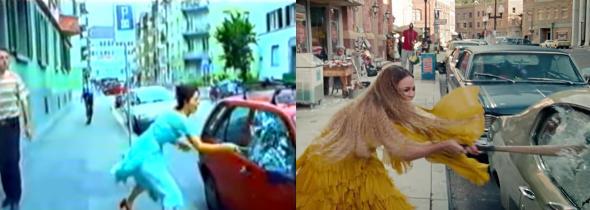Critics and Beyoncé fanatics spent much of this past weekend poring over the artist’s new visual album, Lemonade, to decipher its sometimes oblique references and messages. In one of the album’s most provocative scenes (which coincides with the song “Hold Up”), Beyoncé strolls down the sidewalk in a frilly dress, merrily smashing car windows with a borrowed baseball bat.
For many, the images will immediately call to mind Michael Jackson’s famous car-pounding scene in Black or White (which begins about two minutes into the video below).
But while watching the visual album, I couldn’t help but wonder whether it was also referencing a more obscure work: Pipilotti Rist’s Ever Is Over All, an audiovisual installation from 1997.
If Beyoncé and her collaborators are indeed paying homage to Rist (and I’m not the only one to make the connection), the tribute is an apt one. A Swiss artist, Rist is known for her whimsically mystifying installations, many of which celebrate female joy and sexual pleasure. One of her most famous works requires viewers to stick their head through a hole to see Rist frantically dancing like Minnie Mouse, topless, while singing “I’m not a girl who misses much.” Other installations similarly celebrate femininity and joy. In another of Rist’s videos, the human body grows so abstracted that it becomes nearly indistinguishable from the beautiful fruits, flowers, and jellyfish that are transposed on the screen.
Although she is often labeled a feminist artist, Rist’s precise message can be difficult to decipher in any given work. Ever Is Over All is no exception: The exuberant display of female power—the juxtaposition between Rist’s cheerful demeanor and violent actions—is both charming and cryptic. It seems obvious that Rist is commenting on false expectations of feminine delicacy, but the deeper significance isn’t so easy to divine. All this makes it a perfect point of reference for Beyoncé, whose work frequently charts the intersection between female power and sexuality. The result in Lemonade is simultaneously opaque and thrilling—and a confirmation that Beyoncé is one of the most daring mainstream visual artists of our time.
